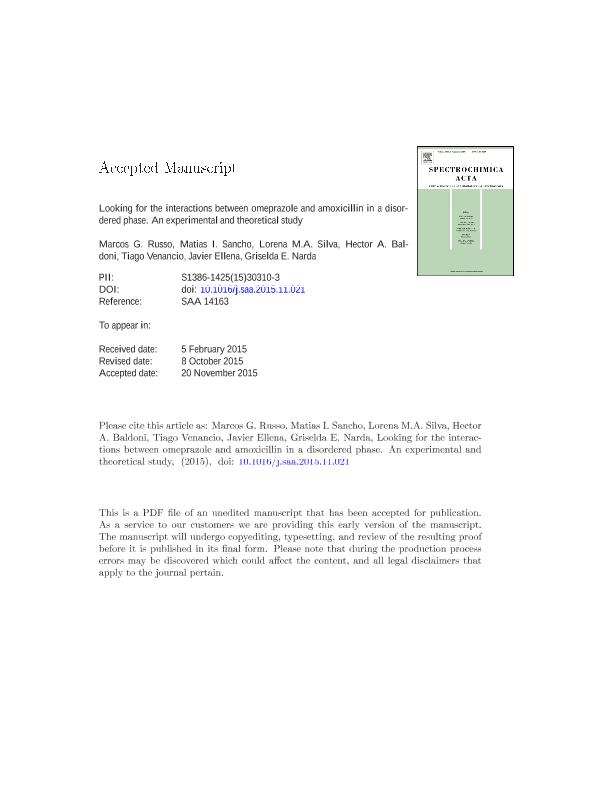Artículo
Looking for the interactions between omeprazole and amoxicillin in a disordered phase. An experimental and theoretical study
Russo, Marcos Guillermo ; Sancho, Matias Israel
; Sancho, Matias Israel ; Silva, Lorena M. A.; Baldoni, Hector Armando
; Silva, Lorena M. A.; Baldoni, Hector Armando ; Venancio, Tiago; Ellena, Javier; Narda, Griselda Edith
; Venancio, Tiago; Ellena, Javier; Narda, Griselda Edith
 ; Sancho, Matias Israel
; Sancho, Matias Israel ; Silva, Lorena M. A.; Baldoni, Hector Armando
; Silva, Lorena M. A.; Baldoni, Hector Armando ; Venancio, Tiago; Ellena, Javier; Narda, Griselda Edith
; Venancio, Tiago; Ellena, Javier; Narda, Griselda Edith
Fecha de publicación:
03/2016
Editorial:
Pergamon-Elsevier Science Ltd
Revista:
Spectrochimica Acta Part A: Molecular and Biomolecular Spectroscopy
ISSN:
1386-1425
Idioma:
Inglés
Tipo de recurso:
Artículo publicado
Clasificación temática:
Resumen
In this paper, co-grinding mixtures of omeprazole-amoxicillin trihydrate (CGM samples) and omeprazole-anhydrous amoxicillin (CGMa samples) at 3:7, 1:1 and 7:3 molar ratios, respectively, were studied with the aim of obtaining a co-amorphous system and determining the potential intermolecular interactions. These systems were fully characterized by differential scanning calorimetry (DSC), FT-infrared spectroscopy (FTIR), X-ray powder diffraction (PXRD), scanning electron microscopy (SEM) and solid state Nuclear Magnetic Resonance (ssNMR). The co-grinding process was not useful to get a co-amorphous system but it led to obtaining the 1:1 CGMa disordered phase. Moreover, in this system both FTIR and ssNMR analysis strongly suggest intermolecular interactions between the sulfoxide group of omeprazole and the primary amine of amoxicillin anhydrous. The solubility measurements were performed in simulated gastric fluid (SGF) to prove the effect of the co-grinding process. Complementarily, we carried out density functional theory calculations (DFT) followed by quantum theory of atoms in molecules (QTAIM) and natural bond orbital (NBO) analyses in order to shed some light on the principles that guide the possible formation of heterodimers at the molecular level, which are supported by spectroscopic experimental findings.
Palabras clave:
Amoxicillin
,
Dft
,
Disordered Phases
,
Drugs Interactions
,
Ftir
,
Nbo
,
Omeprazole
,
Qtaim
,
Ssnmr
Archivos asociados
Licencia
Identificadores
Colecciones
Articulos(IMASL)
Articulos de INST. DE MATEMATICA APLICADA DE SAN LUIS
Articulos de INST. DE MATEMATICA APLICADA DE SAN LUIS
Articulos(IMIBIO-SL)
Articulos de INST. MULTIDICIPLINARIO DE INV. BIO. DE SAN LUIS
Articulos de INST. MULTIDICIPLINARIO DE INV. BIO. DE SAN LUIS
Citación
Russo, Marcos Guillermo; Sancho, Matias Israel; Silva, Lorena M. A.; Baldoni, Hector Armando; Venancio, Tiago; et al.; Looking for the interactions between omeprazole and amoxicillin in a disordered phase. An experimental and theoretical study; Pergamon-Elsevier Science Ltd; Spectrochimica Acta Part A: Molecular and Biomolecular Spectroscopy; 156; 3-2016; 70-77
Compartir
Altmétricas



